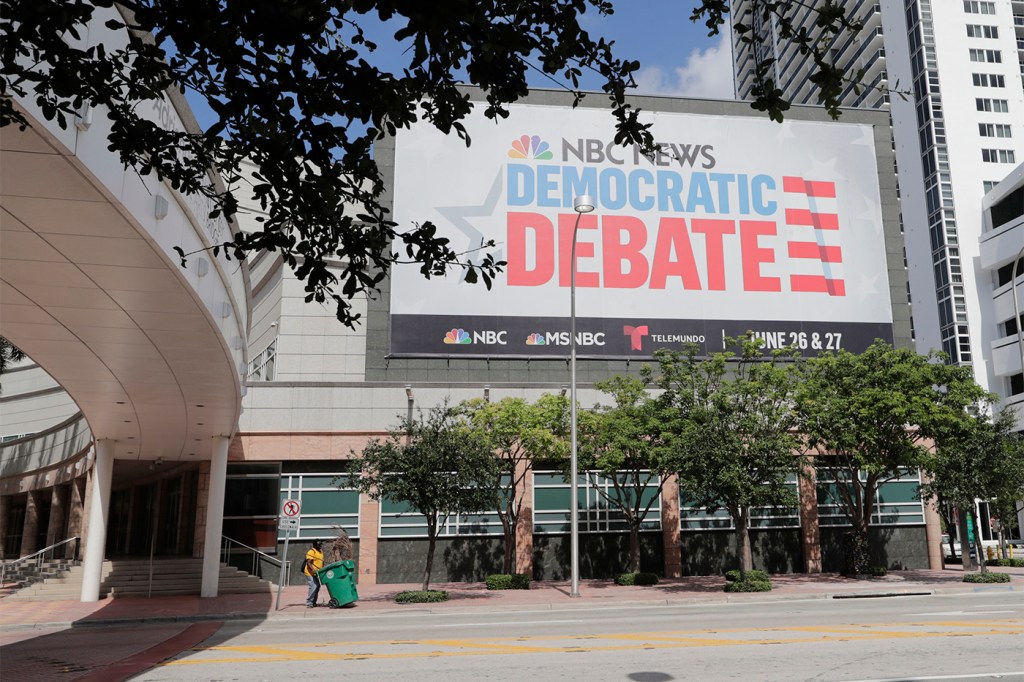Three things to watch for in the Democratic presidential debates

Over the course of two nights, 20 Democrats vying to be the party’s presidential nominee will debate a host of issues. The question is: Will anyone emerge as the front-runner this early in the 2020 U.S. presidential race?
The debates are set for Wednesday and Thursday, from 9 to 11 p.m. Here are three things to watch for, according to two Northeastern professors.
The debates could provide an indication of “the future identity of the Democratic party,” says Thomas Vicino, who is a professor of political science, public policy, and urban affairs, as well as chair of the Department of Political Science.
Gary Young, who is a professor of strategic management and healthcare systems, expects most of the candidates to remain cautious about their plans for healthcare.
The leader of the pack
Twenty of the 23 Democratic candidates were invited to participate in the first Democratic presidential debates. The Democratic National Committee invited the candidates who earned at least 1 percent support in three polls, received donations from 65,000 people, or both. Montana Gov. Steve Bullock; Massachusetts Rep. Seth Moulton; and Miramar, Florida Mayor Wayne Messam didn’t make the cut.
With such a crowded field, the debates will be an opportunity for candidates to distinguish themselves for voters, Vicino says.
And while former Vice President Joe Biden is leading in national polls (32 percent of voters say they support him in the most recent poll), other candidates—including U.S. Sen. Bernie Sanders (who has 27 percent support), U.S. Sen. Elizabeth Warren (14 percent), and U.S. Sen. Kamala Harris (7 percent)—are gaining traction and will likely try to position themselves as better options, Vicino says.
“The biggest issue we’ll see here is: Will anyone emerge as the leader of the pack?” he says.
The issues
There are four key issues to keep an eye on during the debates, Vicino says: healthcare, climate change, immigration, and social policy, such as issues of gender equality, racial equality, and economic class division.
“[President Donald] Trump has made immigration such a platform issue that it’s likely we’ll see the candidates asked to distinguish themselves based on how they view the issue,” Vicino says.
Young, who directs the Northeastern University Center for Health Policy and Healthcare Research, expects Sanders to be the only candidate who presents a strong, polarizing healthcare plan during the debates. The senator from Vermont has introduced a plan for a single, government-run plan that would provide insurance coverage to all Americans.
“I think the other candidates are going to calibrate their responses because they’re focused on the politics of it, while Sanders is not,” Young says, adding that he predicts the other candidates will present something like a “Goldilocks scenario,” which includes a government-run healthcare option in addition to private healthcare plans.
The future of the Democratic party
The debates will likely highlight a “central question” for the Democratic party, Vicino says: “How does the party align itself with public opinion and mainstream America?”
Watch for candidates either to pull left, toward more progressive, liberal policies that would align with the party’s traditional base, or more toward the center in order to win competitive states that Trump narrowly won in 2016, he says.
The candidates will try to answer a critical question, Vicino says. “What is the future identity of the party?”
For media inquiries, please contact Marirose Sartoretto at m.sartoretto@northeastern.edu or 617-373-5718.